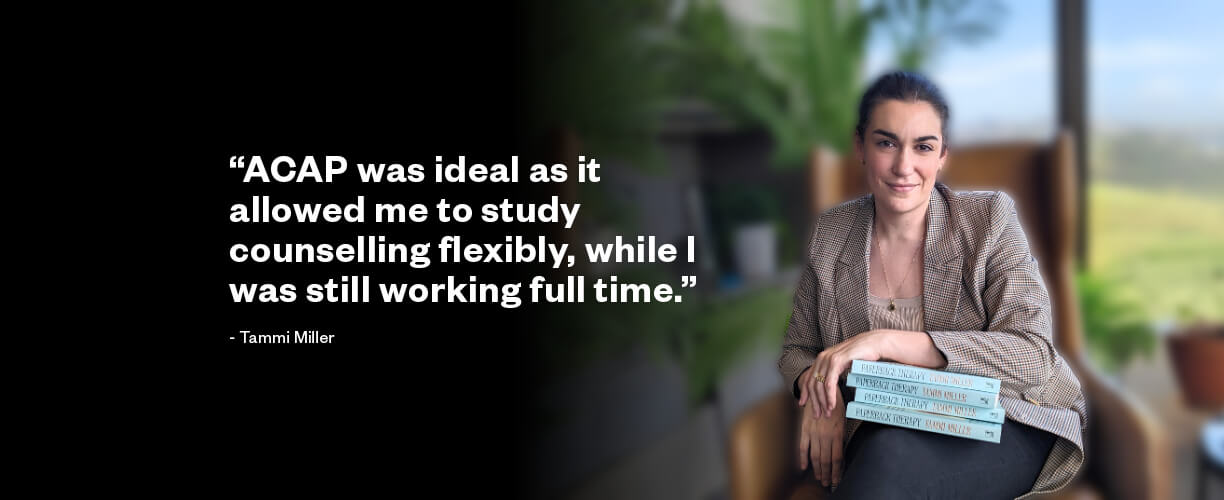Explore the Diploma of Counselling Skills
ACAP alumna Tammi Miller is set to release her debut book, Paperback Therapy in Newtown on 7 March. The book offers readers a beginner’s guide to therapy before seeking out professional help. With the Australian Bureau of Statistics announcing that over one in five Australians suffer from a long-term mental health condition, Tammi’s book aims to debunk therapy while providing expert advice and support for people grappling with mental health challenges.
Hi Tammi, congratulations on your upcoming book, Paperback Therapy. What inspired you to pursue a career in counselling?
When I graduated high school, I had to decide between two different career avenues. One was going down the psychology, counselling and therapy route, and the other was journalism. After 15 years in communications, I wanted to do something that was even more meaningful. ACAP was ideal as it allowed me to study counselling flexibly, while I was still working full time. Since graduating, I now have my own private counselling practice.
Could you tell me about your experience studying Counselling at ACAP and how it prepared you as a counsellor?
It was great. I did all my courses online – having the ability to come onto campus and put the theory into practice was fantastic. What I found most beneficial was the placement I did at the Oakdene House Foundation; which focuses on drug and alcohol addiction. It was really well managed by ACAP from a clinical supervision perspective.
How did the placement impact your learning?
It was very different to the type of counselling I thought I would end up doing. It completely shifted my mindset in terms of career opportunities, and it really served me well when I was writing Paperback Therapy, which features a chapter on Addiction. With one in twenty Australians having a substance use disorder, this was an important inclusion.
I read that you’d said that you wished you had Paperback Therapy when you were struggling with your own mental health. Could you explain that?
I struggled with my mental health during the later years of high school, and like so many during the COVID-19 pandemic. During my high school years, I would see a therapist on and off, but during the pandemic I wasn’t in a financial position to see one as regularly as I needed to.I heard the same experiences from many people who’d lost their jobs or were feeling anxious during isolation – it was a difficult time for much of the country.
I’m very much of the belief that therapists should be well remunerated for their services, however it can be difficult for everyday Australians to prioritise finances or time for the benefit of their mental health. I use a range of therapy resources with clients, and found myself sending these to friends to help them during the pandemic. I thought, ‘what’s needed is a resource which someone can pick up, essentially therapy 101, where they can take care of themselves’. So I created Paperback Therapy: Therapist-approved tools and advice for mastering your mental health. I’d like to emphasise that this book isn’t a substitute for therapy, it’s a bridge to support people until they’re able to see a therapist of their own.
"What I found most beneficial was the placement I did at the Oakdene House Foundation; which focuses on drug and alcohol addiction. It was really well managed by ACAP from a clinical supervision perspective."
Who is this book for?
It’s for those people who perhaps haven’t thought about therapy yet, who can’t yet see a therapist of their own, or who may want a resource to use between sessions in order to stay on top of their mental wellbeing. Addiction, anxiety and depression are the three biggest mental health issues in Australia, and those are covered in the book. It also includes lived experience case studies and expert advice, including from a range of counsellors, psychologist and group therapy facilitators. It would make a wonderful gift to anyone who is struggling with their mental wellbeing or going through a period of adversity.
How do you think the book aligns with what you learnt at ACAP?
It is certainly informed by my counselling education at ACAP. There is a section within the book on narrative and arts therapy, and I am someone who certainly might have benefited from that form of therapy in the past. Essentially it is about unlocking people’s stories and beliefs about themselves. Creative therapies are extremely important – I was first introduced to them at ACAP.
Finally, what advice would you give to anyone considering a career in counselling?
Definitely give it a go. There are not enough counsellors out there, and there are so many people who need help and support with their mental health. I danced around the idea of studying at ACAP for six months, before I finally began. There’s never a good time to change careers, but if you do it tomorrow, you’ll be older than if you started today!
The ACAP Diploma of Counselling Skills can be completed in one year (full-time) and is available by blended delivery or on-campus at Adelaide, Brisbane, Byron Bay, Melbourne, Perth, Sydney. Enrolments for the May intake are now open. Find out more


